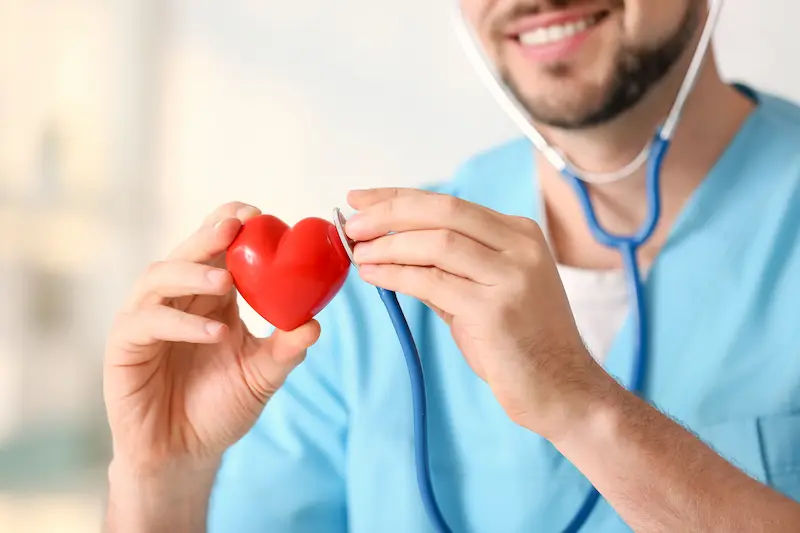Understanding Your Heart Rate: The Basics
Know about the heart rate, what it is, accurate measurement, causes, symptoms, hidden culprits and management of heart rate.

Written by Dr. M L Ezhilarasan
Reviewed by Dr. Dhankecha Mayank Dineshbhai MBBS
Last updated on 13th Jan, 2026

Introduction
Your heart rate, measured in beats per minute (BPM), is the number of times your heart contracts to pump blood throughout your body. It's a dynamic metric, constantly adjusting to your body's demands for oxygen and nutrients. The autonomic nervous system controls this, with the sympathetic nervous system (the "fight or flight" response) accelerating it and the parasympathetic nervous system (the "rest and digest" response) slowing it down.
What is a Normal Resting Heart Rate?
A normal resting heart rate for adults typically ranges from 60 to 100 BPM. Well-conditioned athletes often have resting heart rates closer to 40 BPM because their efficient hearts can pump more blood with each beat. Age also plays a role; children generally have faster resting heart rates than adults.
How to Accurately Measure Your Pulse
To get an accurate resting heart rate, measure it when you are calm and have not recently exerted yourself, consumed caffeine, or been under stress.
1. Place your index and middle fingers on your wrist, just below the base of your thumb (radial artery), or on your neck, to the side of your windpipe (carotid artery).
2. Press lightly until you feel the pulse.
3. Count the number of beats in 30 seconds and multiply by two to get your BPM.
Using a heart rate monitor or a smartwatch can also provide consistent and convenient tracking.
Consult a General practitioner for Personalised Advice
Common Everyday Causes of a Temporary High Heart Rate
Most episodes of a high heart rate are temporary and perfectly normal physiological responses.
Physical Exertion and Exercise
This is the most common cause. During exercise, your muscles require more oxygenated blood. To meet this demand, your heart beats faster and more forcefully. Your maximum predicted heart rate is roughly calculated as 220 minus your age. Reaching 70-85% of this maximum during vigorous activity is standard.
Triggers: Stress, Anxiety, and Excitement
Strong emotions trigger the release of adrenaline (epinephrine), a hormone that prepares your body for action. This causes your heart rate to spike, your breathing to quicken, and your blood pressure to rise. This is a normal fight-or-flight response, whether you're nervous about a presentation or thrilled on a rollercoaster.
Dietary Influences: Caffeine, Sugar, and Nicotine
Stimulants are a major dietary cause of heart palpitations and tachycardia. Caffeine (in coffee, tea, energy drinks) blocks adenosine, a brain chemical that makes you feel tired, leading to increased neuronal activity and a faster heart rate. High sugar intake can cause a surge of insulin, sometimes leading to a rapid drop in blood sugar (hypoglycemia), which the body counters by releasing adrenaline. Nicotine is a direct stimulant that increases heart rate and blood pressure.
Underlying Medical Conditions That Elevate Heart Rate
When a high heart rate is persistent and not linked to an obvious trigger, it could point to a medical condition.
Fever and Infections
When you have a fever, your body's metabolic rate increases to help fight off infection. For every degree Fahrenheit increase in body temperature, your heart rate can increase by about 10 BPM. This is why you often feel your heart pounding when you're ill.
Heart-Related Issues: Arrhythmias and More
This category includes conditions directly affecting the heart's electrical system. Atrial fibrillation (AFib) is a common arrhythmia where the heart's upper chambers beat chaotically and rapidly. Other arrhythmias like supraventricular tachycardia (SVT) cause sudden, dramatic spikes in heart rate. Heart failure, where the heart doesn't pump blood effectively, can also cause a high heart rate as the organ tries to compensate.
Endocrine and Hormonal Imbalances
The thyroid gland regulates metabolism. An overactive thyroid (hyperthyroidism) floods the body with hormones that push all systems into overdrive, leading to a consistently high resting heart rate, anxiety, and weight loss. Similarly, adrenal gland disorders like pheochromocytoma can cause episodic adrenaline surges.
Anemia and Blood-Related Causes
Anaemia occurs when you don't have enough healthy red blood cells to carry adequate oxygen to your tissues. To compensate for the lack of oxygen, your heart has to work harder and pump faster, leading to tachycardia. Significant blood loss will have the same effect.
Medications and Substances That Can Increase Pulse
Many common medications list tachycardia as a potential side effect. These include:
- Decongestants (e.g., pseudoephedrine, phenylephrine)
- Asthma inhalers (albuterol)
- Thyroid medications (if over-prescribed)
- Some weight loss drugs and appetite suppressants
- Illegal stimulants like cocaine and amphetamines are also potent causes of a dangerously high heart rate.
- Dehydration and Electrolyte Imbalance: A Hidden Culprit
When you're dehydrated, your blood volume decreases. This means there's less fluid for your heart to pump, causing a drop in blood pressure. To maintain adequate blood flow to your organs, your heart beats faster. Electrolytes like potassium, magnesium, and calcium are crucial for conducting the electrical impulses that control your heartbeat. An imbalance can disrupt this process and lead to arrhythmias and a high pulse.
When to Be Concerned: Symptoms That Need a Doctor?
While often harmless, a high heart rate warrants medical attention if it's accompanied by:
- Chest pain, pressure, or discomfort
- Severe shortness of breath
- Fainting, dizziness, or lightheadedness
- Pain that radiates to your jaw, neck, or arm
These could be signs of a heart attack, pulmonary embolism, or other serious condition. Seek emergency care immediately. If your condition does not improve after trying rest and hydration, or if you experience frequent, unexplained episodes, consult a doctor online with Apollo24|7 for further evaluation.
Diagnosis: How Doctors Find the Root Cause
If you report a persistent high heart rate, a doctor will typically:
1. Take a detailed history of your symptoms, lifestyle, and family history.
2. Perform a physical exam, including listening to your heart.
3. Order an electrocardiogram (ECG/EKG) to check your heart's electrical activity.
4. They may recommend a Holter monitor, a portable EKG you wear for 24-48 hours to catch intermittent arrhythmias.
5. Blood tests to check for anemia, thyroid issues, or electrolyte imbalances. Apollo24|7 offers convenient home collection for tests like thyroid panels (TSH, T3, T4) and complete blood count (CBC) to help diagnose these underlying issues.
Managing and Lowering a High Heart Rate
Immediate Calming Techniques
- Vagal Manoeuvres: Techniques like bearing down (as if having a bowel movement), coughing, or splashing cold water on your face can stimulate the vagus nerve, which helps slow the heart rate. (Note: Only try this if a doctor has instructed you to for a known condition like SVT.)
- Deep Breathing: Slow, deep breaths can activate the parasympathetic nervous system, promoting relaxation and slowing the heart.
- Rest and Hydration: If your fast heart rate is due to exertion or dehydration, stopping to rest and drinking water is the best remedy.
Long-Term Lifestyle Modifications
- Regular Exercise: This improves your heart's efficiency, lowering your resting heart rate over time.
- Stress Management: Practices like meditation, yoga, and mindfulness can reduce baseline anxiety and stress levels.
- Dietary Changes: Limiting stimulants like caffeine and alcohol, and reducing sugar intake can prevent dietary triggers.
- Adequate Sleep: Poor sleep can disrupt the autonomic nervous system, leading to a higher resting heart rate.
Conclusion
Your heart rate is a powerful messenger, offering real-time feedback on your physical and emotional state. While it's designed to fluctuate, understanding the difference between a normal response and a potential warning sign is crucial for your long-term health. By paying attention to the contexts in which your heart races be it from a morning coffee, a stressful deadline, or for no apparent reason you become an active participant in your well-being. Remember, knowledge is the first step toward action. If your symptoms are persistent, severe, or causing you concern, do not hesitate to seek professional guidance.
Consult a General practitioner for Personalised Advice
Consult a General practitioner for Personalised Advice

Dr. Mainak Baksi
General Practitioner
13 Years • MBBS , MD (MPH)
Howrah
Mainak Baksi Clinic, Howrah
(50+ Patients)

Dr. Rajib Ghose
General Physician/ Internal Medicine Specialist
25 Years • MBBS
East Midnapore
VIVEKANANDA SEBA SADAN, East Midnapore

Dr. Shiv Krishna Mitra
General Practitioner
15 Years • MBBS GEN. MED. PGDRM, MCH
Kolkata
Samaritan Clinic, Kolkata

Dr. Anamika Krishnan
General Practitioner
11 Years • MBBS, DNB (Paediatrics) ,Diploma in child Health
Bengaluru
UMC (United Medical Center), Bengaluru

Dr. Thorana Prakash M
General Physician
2 Years • MBBS
Bengaluru
PRESTIGE SHANTHINIKETAN - SOCIETY CLINIC, Bengaluru
Consult a General practitioner for Personalised Advice

Dr. Mainak Baksi
General Practitioner
13 Years • MBBS , MD (MPH)
Howrah
Mainak Baksi Clinic, Howrah
(50+ Patients)

Dr. Rajib Ghose
General Physician/ Internal Medicine Specialist
25 Years • MBBS
East Midnapore
VIVEKANANDA SEBA SADAN, East Midnapore

Dr. Shiv Krishna Mitra
General Practitioner
15 Years • MBBS GEN. MED. PGDRM, MCH
Kolkata
Samaritan Clinic, Kolkata

Dr. Anamika Krishnan
General Practitioner
11 Years • MBBS, DNB (Paediatrics) ,Diploma in child Health
Bengaluru
UMC (United Medical Center), Bengaluru

Dr. Thorana Prakash M
General Physician
2 Years • MBBS
Bengaluru
PRESTIGE SHANTHINIKETAN - SOCIETY CLINIC, Bengaluru
More articles from Heart disease
Frequently Asked Questions
Why is my heart beating fast for no reason?
It can feel like it's for 'no reason,' but there's often a trigger. It could be subtle anxiety (like from scrolling through stressful news), mild dehydration, residual caffeine, or a hormonal shift. However, if episodes are frequent and unexplained, it's important to see a doctor to rule out conditions like arrhythmia or hyperthyroidism.
What is considered a dangerously high heart rate?
A heart rate is generally considered dangerous when it is sustained at very high levels (often over 100-120 BPM at rest) and is accompanied by symptoms like dizziness, chest pain, or fainting. The context is critical; a rate of 180 BPM during exercise is normal, but the same rate at rest is a medical emergency.
Can dehydration cause a high heart rate?
Absolutely. Dehydration reduces blood volume, forcing your heart to beat faster to maintain blood pressure and circulate the reduced amount of blood to your muscles and organs. This is a common cause of a high heart rate, especially in hot weather or after illness.
How can I lower my heart rate quickly?
The safest and most effective methods are to stop any activity, sit or lie down, and practice slow, deep breathing (inhale for 4 counts, hold for 4, exhale for 6). Ensuring you are hydrated can also help. Avoid quick fixes found online unless specifically recommended by your doctor for a diagnosed condition.
When should I go to the ER for a rapid heart rate?
Go to the emergency room immediately if your rapid heart rate is accompanied by: chest pain or pressure, difficulty breathing, fainting or severe dizziness, or pain radiating to your arm, neck, or jaw. These are red flag symptoms that require urgent evaluation.

